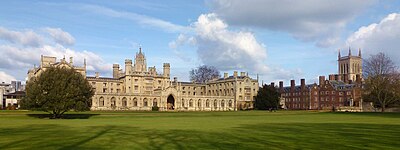List of non-ecclesiastical works by Thomas Rickman
 From Wikipedia - Reading time: 6 min
From Wikipedia - Reading time: 6 min

Thomas Rickman (1776–1841) was a self-taught English architect who practised in Liverpool and Birmingham. His major output consisted of new churches, most of which were in Gothic Revival style. He also restored and made additions and alterations to churches, and worked on other designs, including country houses, public buildings, schools, and banks.[1]
Rickman was born in Maidenhead, Berkshire. He trained in medicine and practised in Lewes, Sussex, from 1801 to 1803, but did not continue in this career, working in London with a corn factor, and then moving to Liverpool in 1808 to work as an insurance clerk. During this time he had begun to take an interest in Gothic architecture. While in Liverpool he met John Cragg, the owner of an iron foundry, and with him designed three churches. using cast iron for both their construction and decoration. He then worked with John Slater in the redesign of Scarisbrick Hall. In 1817 he opened an architectural office in Liverpool, and the following year he was joined by Henry Hutchinson, initially as a pupil, and from 1821 as a partner. Meanwhile, in 1817 he published the first edition of An Attempt to Discriminate the Styles of English Architecture.[1] In this he divided English architecture into styles that have continued to be accepted since, namely Norman, Early English, Decorated, and Perpendicular.[2]
Rickman then became involved with the Church Commissioners, designing, with others, a series of churches that have become to be known as Commissioners' churches, the first of his being St George's Church in Birmingham. He opened an office in that city in 1820, and moved there with Hutchinson the following year, where he spent the rest of his career. At about this time he was appointed as architect to Worcester Cathedral, and shortly after this he started work with Hutchinson on what was to become his major commission, New Court at St John's College, Cambridge. In 1830 he was elected to the Society of Antiquaries of London, thus acknowledging his acceptance into the profession. Hutchinson died in 1831, and during that year R. C. Hussey joined the practice, becoming a partner in 1835. Rickman died from liver disease in 1841.[1]
This list includes details of works on non-ecclesiastical buildings by Thomas Rickman.
Key
[edit]| Grade | Criteria[3] | ||||||||||||
|---|---|---|---|---|---|---|---|---|---|---|---|---|---|
| Grade I | Buildings of exceptional interest, sometimes considered to be internationally important. | ||||||||||||
| Grade II* | Particularly important buildings of more than special interest. | ||||||||||||
| Grade II | Buildings of national importance and special interest. | ||||||||||||
| "—" denotes a work that is not graded. | |||||||||||||
Churches
[edit]See also
[edit]- List of new churches by Thomas Rickman
- List of church restorations and alterations by Thomas Rickman
References
[edit]- ^ a b c d Aldrich, Megan (2009) [2004], "Rickman, Thomas (1776–1841)", Oxford Dictionary of National Biography, Oxford University Press, retrieved 9 April 2012 ((subscription or UK public library membership required))
- ^ Rickman 1835, p. 39.
- ^ Listed Buildings, Historic England, retrieved 29 March 2015
- ^ Historic England, "Scarisbrick Hall (1038565)", National Heritage List for England, retrieved 9 April 2012
- ^ Hartwell & Pevsner 2009, pp. 599–606.
- ^ Hubbard 1986, pp. 175–178.
- ^ Historic England, "Maitland House (1245619)", National Heritage List for England, retrieved 7 April 2012
- ^ Historic England, "Town Hall, Clitheroe (1072374)", National Heritage List for England, retrieved 6 April 2012
- ^ Hartwell & Pevsner 2009, p. 242.
- ^ Historic England, "Ettington Park Hotel (1382586)", National Heritage List for England, retrieved 8 April 2012
- ^ Historic England, "The Old Sessions House, Preston (1219103)", National Heritage List for England, retrieved 7 April 2012
- ^ Historic England, "The Down House (1302873)", National Heritage List for England, retrieved 7 April 2012
- ^ Historic England, "Stables, The Down House (1341973)", National Heritage List for England, retrieved 7 April 2012
- ^ Historic England, "Castle Bromwich Hall (1366587)", National Heritage List for England, retrieved 8 April 2012
- ^ Historic England, "St John's College, New Court, Cambridge (1332178)", National Heritage List for England, retrieved 7 April 2012
- ^ Historic England, "Brunstock House (1087726)", National Heritage List for England, retrieved 6 April 2012
- ^ Hyde & Pevsner 2010, pp. 413–414.
- ^ Historic England, "Matfen Hall (1155328)", National Heritage List for England, retrieved 7 April 2012
- ^ Matfen Hall Hotel, Prima Hotel Group, archived from the original on 13 April 2012, retrieved 7 April 2012
- ^ Historic England, "Rose Castle (1087473)", National Heritage List for England, retrieved 6 April 2012
- ^ Hyde & Pevsner 2010, pp. 589–593.
- ^ Historic England, "Midland Bank, Birmingham (1075753)", National Heritage List for England, retrieved 8 April 2012
- ^ Historic England, "Henbury Village Hall (1202073)", National Heritage List for England, retrieved 7 April 2012
- ^ Staffordshire Archives Bradford MSS inc Designs (i.e. D1287/M/385) and correspondence with 2nd Earl of Bradford
- ^ Historic England, "Draper's Hall, Coventry (1076660)", National Heritage List for England, retrieved 8 April 2012
- ^ Historic England, "Goodnestone Park (1070296)", National Heritage List for England, retrieved 6 April 2012
- Bibliography
- Hartwell, Clare; Pevsner, Nikolaus (2009) [1969], Lancashire: North, The Buildings of England, New Haven and London: Yale University Press, ISBN 978-0-300-12667-9
- Hubbard, Edward (1986), Clwyd, The Buildings of Wales, London: Penguin, ISBN 0-14-071052-3
- Hyde, Matthew; Pevsner, Nikolaus (2010) [1967], Cumbria, The Buildings of England, New Haven and London: Yale University Press, ISBN 978-0-300-12663-1
- Rickman, Thomas (1835), An attempt to discriminate the styles of architecture in England from the Conquest to the Reformation (4 ed.), London: Longman, Rees, Orme, Green and Longman, retrieved 19 February 2011
 KSF
KSF










